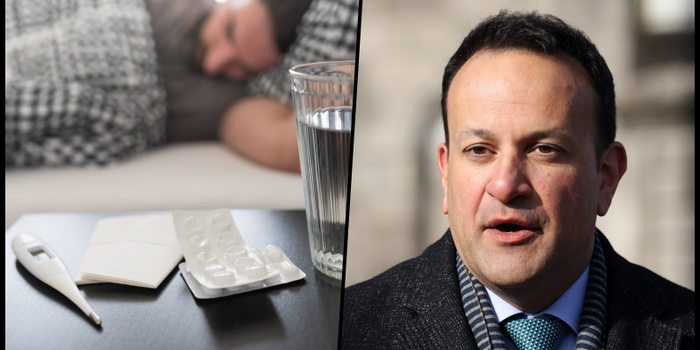“No one should feel pressured to come to work when they are ill because they can’t afford not to.”
Cabinet has approved plans to introduce the right for all workers in Ireland to receive paid sick leave.
Tánaiste and Minister for Enterprise, Trade and Employment Leo Varadkar announced the approval of the new law on Wednesday morning (30 March).
Plans to introduce paid sick leave were first considered in the summer of 2021.
Ireland is one of the few countries in Europe without an entitlement to mandatory sick leave.
At the moment, sick leave is provided to only about half of all workers in the country.
“The pandemic exposed the precarious position of many people, especially in the private sector and in low-paid roles, when it comes to missing work due to illness,” Varadkar said.
“No one should feel pressured to come to work when they are ill because they can’t afford not to.”
The plan is set to be phased in over four years, with more days being made available to workers as years go on.
Three days will be covered this year, then five in 2024, seven in 2025, and finally 10 days in 2026.
The scheme will be available to all workers, regardless of their illness.
Sick pay will be paid by employers at a rate of 70% of an employee’s wage, subject to a daily maximum threshold of €110.
The threshold is based on the 2019 mean weekly earnings of €786.33 and equates to an annual salary of €40,889.16.
It can also be revised by ministerial order in line with inflation and changing incomes.
Workers will require a medical certificate to receive the payment, and will have had to work for the company for a minimum of 13 weeks.
“I fully understand that many businesses are struggling at the moment with additional costs because of the Russian invasion of Ukraine, as well as the aftermath of Covid and Brexit and the disruption both have brought,” Varadkar said.
“That is why we have chosen to phase this in, in this way. We have made a big effort to design the scheme so that it’s easy to use, fair and affordable for employers.
“We’ve done a lot of consultation on this, with representatives from both the employee and employer side and although I know some will think it goes too far and others that it doesn’t go far enough, I think it has struck a fair and reasonable balance,” the Tánaiste concluded.
Greg Ennis, senior official at the Services Industrial Professional and Technical Union (SIPTU) has said that the measures are “not nearly good enough”.
Speaking at Siptu’s annual conference in Sligo on Tuesday, as reported by The Irish Times, Ennis described the provision for 10 days by 2026 as “extremely limited”, and said that employers may use this as an opportunity to remove existing sick leave schemes.
The legislation of the law says that “this does not prevent employers offering better terms or unions negotiating for more through a collective agreement”.
LISTEN: You Must Be Jokin’ with Aideen McQueen – Faith healers, Coolock craic and Gigging as Gaeilge












































